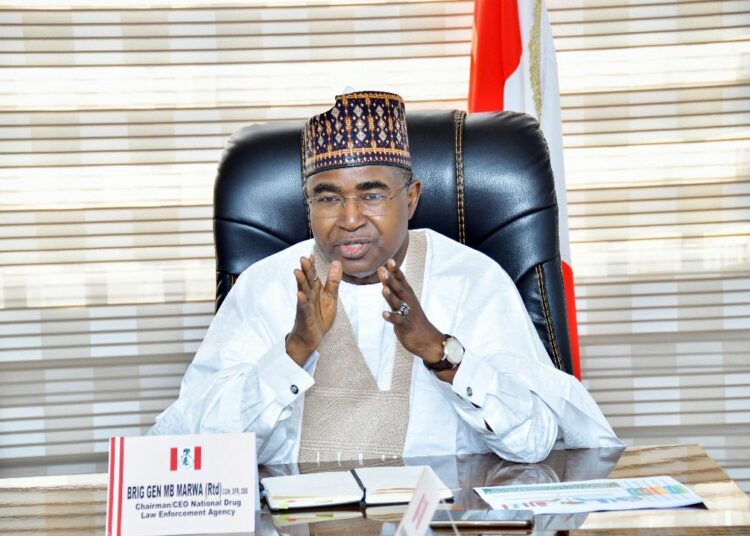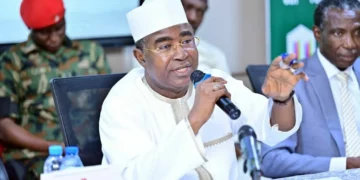Chairman of the National Drug Law Enforcement Agency (NDLEA), Brig-Gen Mohamed Buba Marwa (retd), has revealed that he once had to dismiss a pilot from his now-defunct airline, Albarka Air, due to drug abuse.
Marwa spoke in a revealing address at the third edition of The Conversation Conference held in Abuja on World Mental Health Day, organised by the Intersect Consortium alongside Action Against Hunger and the International Rescue Committee.
He shared that the incident took place 21 years ago when the pilot, under the influence of drugs, caused a scare among passengers while flying to Maiduguri, Borno State capital. Reflecting on the incident, Marwa stated, “I used to run an airline called Albarka Air, and one of our best flights was on Fridays, from Lagos, Abuja, to Maiduguri. It was always full on weekends.”
The NDLEA boss recounted that on that particular Friday, he received numerous calls from passengers reporting unsettling behaviour from the pilot. During a turbulence episode, the pilot reportedly announced, “Ladies and gentlemen, I have bad news for you,” before pausing, causing panic among passengers. He later explained they would be diverting the flight to Kano, a delay that Marwa deemed unacceptable.
Further investigation confirmed that the pilot was under the influence of a psychoactive substance. Known for his zero tolerance towards drug-related offences, Marwa took swift action. “I investigated and discovered it happened. So I fired him immediately without wasting time and reported him to the NCAA,” he explained. This incident also led Marwa to implement random drug tests for all pilots and crew members in the then Albarka Air.
Marwa emphasised the importance of drug testing in workplaces, stating, “The need for drug testing in our workplace cannot be over-emphasized. It is therefore important to implement drug integrity testing policies in the workplace.”
At the same event, Ayodele Olawande, the Minister of State for Youth Development, highlighted the Ministry’s commitment to addressing substance abuse among Nigerian youth. He noted that many young people struggle with substance abuse with minimal support, and announced plans for a mental health awareness campaign. “I can assure you that in the next one week, you will hear more from me on this (issue of) mental health,” Olawande said.
Olawande further emphasised the role mental health plays in the broader societal context, attributing many challenges to unaddressed mental health issues. “The major problem we are facing is because our mental health is not being taken care of. Nobody cares about anybody,” he remarked.
Vincent Udenze, host of The Conversation Conference, also expressed concern over how mental health issues are often mistaken for other ailments, such as malaria. “Mental health is often mistaken for malaria or stress,” he observed. He highlighted the importance of employers taking an active interest in their employees’ well-being, regardless of their role. “Every employer should be able to ask after the welfare of their employees, including the gate man,” he added.
The event served as a platform for key figures to address the critical need for mental health support and the role of drug testing policies in enhancing workplace safety, reflecting an ongoing commitment to improving the mental well-being of Nigerians.





